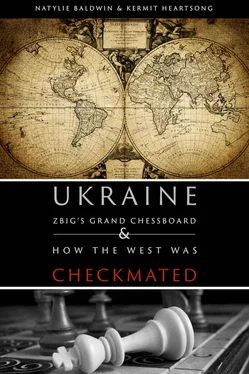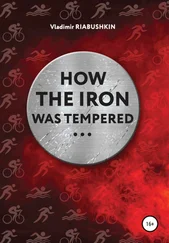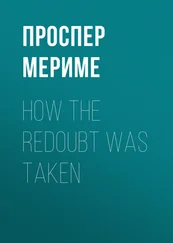Kermit Heartsong - Ukraine - ZBIG's Grand Chess Board & How The West Was Checkmated
Здесь есть возможность читать онлайн «Kermit Heartsong - Ukraine - ZBIG's Grand Chess Board & How The West Was Checkmated» весь текст электронной книги совершенно бесплатно (целиком полную версию без сокращений). В некоторых случаях можно слушать аудио, скачать через торрент в формате fb2 и присутствует краткое содержание. Год выпуска: 2015, Жанр: Политика, на английском языке. Описание произведения, (предисловие) а так же отзывы посетителей доступны на портале библиотеки ЛибКат.
- Название:Ukraine: ZBIG's Grand Chess Board & How The West Was Checkmated
- Автор:
- Жанр:
- Год:2015
- ISBN:нет данных
- Рейтинг книги:4 / 5. Голосов: 1
-
Избранное:Добавить в избранное
- Отзывы:
-
Ваша оценка:
- 80
- 1
- 2
- 3
- 4
- 5
Ukraine: ZBIG's Grand Chess Board & How The West Was Checkmated: краткое содержание, описание и аннотация
Предлагаем к чтению аннотацию, описание, краткое содержание или предисловие (зависит от того, что написал сам автор книги «Ukraine: ZBIG's Grand Chess Board & How The West Was Checkmated»). Если вы не нашли необходимую информацию о книге — напишите в комментариях, мы постараемся отыскать её.
Ukraine: ZBIG's Grand Chess Board & How The West Was Checkmated — читать онлайн бесплатно полную книгу (весь текст) целиком
Ниже представлен текст книги, разбитый по страницам. Система сохранения места последней прочитанной страницы, позволяет с удобством читать онлайн бесплатно книгу «Ukraine: ZBIG's Grand Chess Board & How The West Was Checkmated», без необходимости каждый раз заново искать на чём Вы остановились. Поставьте закладку, и сможете в любой момент перейти на страницу, на которой закончили чтение.
Интервал:
Закладка:
…Today the Clinton administration's chief defense for their hand in Russia's ruin is that somebody had to keep the communists at bay. But there were no communists in Russia by late 1991, only nascent investment bankers looking to nail down a stake any which way. (Williamson 1999)
The Economic Reforms of Putin and Medvedev
The conditions described in the previous section constituted the mess that Vladimir Putin faced when he took over as President of the Russian Federation in 2000. It should be noted that Putin started his presidency having to navigate these crises amidst ruthless political clans within the Kremlin that were inherited from the Yeltsin era, without the support of a political party, and the very real threat of being assassinated or overthrown if he trusted the wrong person or stepped too heavily on the wrong toes.
Some observers who were on the ground in Russia during this time believe that this is the reason Putin brought in trusted, dependable, and often life-long friends and colleagues from St. Petersburg to comprise his political team. Western media, out of ignorance or malice, began referring to these new Putin appointees as the St. Petersburg “Chekists”—a pejorative for Soviet era secret police (Tennison 2012).
Putin's team gradually implemented policies that stabilized the country, improved infrastructure and standards of living for many Russians, and led to a decrease in crime and chaos.
Sharon Tennison has visited different parts of Russia regularly over her three decades-long career there. She describes the changes over the past fourteen years as follows:
During this time, I’ve traveled throughout Russia several times every year, and have watched the country slowly change under Putin’s watch. Taxes were lowered, inflation lessened, and laws slowly put in place. Schools and hospitals began improving. Small businesses were growing, agriculture was showing improvement, and stores were becoming stocked with food.
Highways were being laid across the country, new rails and modern trains appeared even in far out places, and the banking industry was becoming dependable. Russia was beginning to look like a decent country — certainly not where Russians hoped it to be long term, but improving incrementally for the first time in their memories. (Tennison 2014)
Tennison observed the same improvements starting to appear in areas farther away from the major cities:
In September [2013] I traveled out to the Ural Mountains, spent time in Ekaterinburg, Chelyabinsk and Perm. We traveled between cities via autos and rail — the fields and forests look healthy, small towns sport new paint and construction. Old concrete Khrushchev block houses are giving way to new multi-story private residential complexes which are lovely. High-rise business centers, fine hotels and great restaurants are now commonplace — and ordinary Russians frequent these places. Two and three story private homes rim these Russian cities far from Moscow.
We visited new museums, municipal buildings and huge supermarkets. Streets are in good repair, highways are new and well marked now, service stations look like those dotting American highways. In January [2014] I went to Novosibirsk out in Siberia where similar new architecture was noted. Streets were kept navigable with constant snowplowing, modern lighting kept the city bright all night, lots of new traffic lights have appeared. It is astounding to me how much progress Russia has made in the past 14 years since an unknown man with no experience walked into Russia’s presidency and took over a country that was flat on its belly. (Tennison 2014)
Moreover, those who didn’t have an agenda of Russia-bashing acknowledged the impressive infrastructure at the Sochi Olympics, including “state-of-the-art bridges, roads, and tunnels.” The majority of this infrastructure is permanent for the city (Kovacevic 2014).
When Putin, at the outset of his first term as president, met with his circle of economic advisors to come up with a plan to restore stability and improvement, it is reported that, due to the fact that he was a novice, he spent a lot of the time at these meetings listening and asking questions. The one question he consistently asked when a policy was being considered was what its effect on social welfare would be (Roxburgh 2013).
According to Angus Roxburgh, the concept of the “collective” interest was not merely a communist contrivance — it has deep roots in Russian culture. Many Russians have expressed nostalgia for the Soviet era because during that time they felt a relative sense of belonging and common identity as well as stability (Roxburgh 2013; Cohen 2011).
The economic team Putin had put together included, among others, lawyer-businessman German Gref, Deputy Finance Minister Alexei Kudrin, and liberal economist Andrei Illarionov. One of the major problems to be addressed was solving Russia’s revenue crisis due to much of Russia’s wealth leaving the country, along with poor people refusing to pay high tax rates on meager incomes.
Subsequently, they came up with a plan to reduce the tax rate in the hopes that it would be paid. Personal income tax rates were decreased from as high as 30 percent to a flat rate of 13 percent. Corporate rates were dropped from 35 percent to 24 percent. It should be noted that the IMF did not like the plan. When the Russian government stated that it would stick with the plan regardless, the IMF left the country (Roxburgh 2013).
It was a gamble that paid off as Russians started to pay their taxes and eventually the government had surpluses. Additionally, Putin had ordered the oligarchs to pay taxes and stay out of politics if they wanted to keep the loot they’d acquired from the Yeltsin years, which also added to the revenue stream.
A revolutionary land code was established allowing for buying and selling of residential property. A new legal code that sought to fight money laundering and to break up certain monopolies was implemented — though some monopolies remained, namely Gazprom in the gas industry (Roxburgh 2013).
The Partnership and Cooperation Agreement (PCA) that went into effect in 1997 paved the way for increased trade relations between Russia and the EU. Trade consisting mainly of mineral fuel products (77.3 percent) along with some manufactured goods, chemicals and raw materials, were worth 115 billion euros ($150.6 billion). EU exports to Russia were worth 65.6 billion euros ($86 billion). By 2012, overall trade between Russia and the EU totaled 325 billion euros ($426 billion), with EU as Russia's largest trading partner at 41 percent. Trade between Russia and Germany alone in 2013 amounted to 76 billion euros ($100 billion) (Euronews 2014).
From 1999 to 2008, Russia's GDP had increased by an average of 7 percent per year. A Stabilization or rainy day fund was established that included a $140 billion Reserve fund and a $30 billion National Welfare fund to ensure that pensions could be paid. The rate of Russians living in poverty decreased from 30 percent in 2000 to 14 percent in 2008, with average wages having quintupled, though this was skewed due to the existence of a small ultra-wealthy group. Moreover, Russia had decreased its inflation rate from 20 percent to 9 percent (Roxburgh 2013; Mellow 2013; RIA Novosti 2008).
By 2006, Russia had paid off most of its external debt, including all money owed to the IMF. When the Russian Ministry of Finance approached the Paris Club, a group of billionaire bankers, and offered to repay all Russia’s external debts early, they were rebuffed as the international bankers preferred to have the debt outstanding as long as possible in order to maintain control, which is what these international financial arrangements are really about. But, as of 2012, Russia was still paying the debt ahead of schedule (Johnson 2012).
Читать дальшеИнтервал:
Закладка:
Похожие книги на «Ukraine: ZBIG's Grand Chess Board & How The West Was Checkmated»
Представляем Вашему вниманию похожие книги на «Ukraine: ZBIG's Grand Chess Board & How The West Was Checkmated» списком для выбора. Мы отобрали схожую по названию и смыслу литературу в надежде предоставить читателям больше вариантов отыскать новые, интересные, ещё непрочитанные произведения.
Обсуждение, отзывы о книге «Ukraine: ZBIG's Grand Chess Board & How The West Was Checkmated» и просто собственные мнения читателей. Оставьте ваши комментарии, напишите, что Вы думаете о произведении, его смысле или главных героях. Укажите что конкретно понравилось, а что нет, и почему Вы так считаете.











